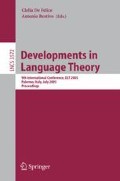Abstract
Given a class \(\mathcal{C}\) of languages, the Inclusion Problem for \(\mathcal{C}\) consists of deciding whether for \(L_{1},L_{2}\in\mathcal{C}\) we have L 1 ⊆ L 2.
In this work we prove that the Inclusion Problem is decidable for the class of unambiguous rational trace languages that are subsets of the monoid (((a
\(_{\rm 1}^{\rm \star}\)
 b
\(_{\rm 1}^{\rm \star}\))× c
\(_{\rm 1}^{\rm \star}\))
b
\(_{\rm 1}^{\rm \star}\))× c
\(_{\rm 1}^{\rm \star}\)) ((a
\(_{\rm 2}^{\rm \star}\)
((a
\(_{\rm 2}^{\rm \star}\)
 b
\(_{\rm 2}^{\rm \star}\))× c
\(_{\rm 2}^{\rm \star}\)))× c
\(_{\rm 3}^{\rm \star}\).
b
\(_{\rm 2}^{\rm \star}\))× c
\(_{\rm 2}^{\rm \star}\)))× c
\(_{\rm 3}^{\rm \star}\).
Partially supported by the Project M.I.U.R. COFIN 2003-2005 “Formal languages and automata: methods, models and applications”
Access this chapter
Tax calculation will be finalised at checkout
Purchases are for personal use only
Preview
Unable to display preview. Download preview PDF.
References
Aalbersberg, I.J., Hoogeboom, H.J.: Characterizations of the decidability of some problems for regular trace languages. Mathematical Systems Theory 22, 1–19 (1989)
Bernstein, N.: Modules over a ring of differential operators, study of the fundamental solutions of equations with constant coefficients. Functional Anal. Appl. 5, 1–16 (1971) (russian); 89–101 (english)
Berstel, J., Reutenauer, C.: Rational Series and Their Languages. EATCS Monographs on Theoretical Computer Science, vol. 12. Springer, Heidelberg (1988)
Bertoni, A., Goldwurm, M., Mauri, G., Sabadini, N.: Counting Techniques for Inclusion, Equivalence and Membership Problems. In: Diekert, V., Rozemberg, G. (eds.) The Book of Traces, pp. 131–163. World Scientific, Singapore (1995)
Bertoni, A., Mauri, G., Sabadin, N.: Unambiguous regular trace languages. In: Proc. of the Coll. on Algebra, Combinatorics and Logic in Computer Science, Colloquia Mathematica Soc. J. Bolyay, North Holland, vol. 42, pp. 113–123 (1985)
Bertoni, A., Massazza, P.: A parallel algorithm for the hadamard product of holonomic formal series. IJAC 4(4), 561–573 (1994)
Bertoni, A., Massazza, P.: On the Inclusion Problem for Finitely Ambiguous Rational Trace Languages. RAIRO Theoretical Informatics and Applications 32(1-2-3), 79–98 (1998)
Bertoni, A., Massazza, P., Sabadini, N.: Holonomic generating functions and context free languages. International Journal of Foundations of Computer Science 3(2), 181–191 (1992)
Chyzak, F.: An Extension of Zeilberger’s Fast Algorithm to General Holonomic Functions. In: Proceedings of FPSAC, Universitat Wien, pp. 172–183 (1997)
Furstenberg, H.: Algebraic functions over finite fields. Journal of Algebra 7, 271–277 (1967)
Gibbons, A., Rytter, W.: On the decidability of some problems about rational subsets of free partially commutative monoids. Theoretical Computer Science 48, 329–337 (1986)
Ibarra, O.H.: Reversal-bounded multicounter machines and their decision problems. Journal of the Association of Computing Machinery 25, 116–133 (1978)
Lipshitz, L.: The diagonal of a D−Finite Power Series is D−Finite. Journal of Algebra 113, 373–378 (1988)
Mazurkiewicz, A.: Concurrent program schemes and their interpretations, DAIMI Rep. PB-78, Aarhus Univ. (1977)
Lipshitz, L.: D-Finite Power Series. Journal of Algebra 122, 353–373 (1989)
Salomaa, A., Soittola, M.: Automata-Theoretic Aspects of formal power series. Springer, New York (1978)
Schützenberger, M.P.: On the definition of a family of automata. Information and Control 4, 245–270 (1961)
Stanley, R.P.: Differentiably Finite Power Series. European Journal of Combinatorics 1, 175–188 (1980)
Varricchio, S.: On the decidability of the equivalence problem for partially commutative rational power series, LITP, Univ. Paris VII, Internal report 90.97 (1990)
Zeilberger, D.: A holonomic systems approach to special functions identities. J. Comput. Appl. Math. 32, 321–368 (1990)
Author information
Authors and Affiliations
Editor information
Editors and Affiliations
Rights and permissions
Copyright information
© 2005 Springer-Verlag Berlin Heidelberg
About this paper
Cite this paper
Massazza, P. (2005). The Inclusion Problem for Unambiguous Rational Trace Languages. In: De Felice, C., Restivo, A. (eds) Developments in Language Theory. DLT 2005. Lecture Notes in Computer Science, vol 3572. Springer, Berlin, Heidelberg. https://doi.org/10.1007/11505877_31
Download citation
DOI: https://doi.org/10.1007/11505877_31
Publisher Name: Springer, Berlin, Heidelberg
Print ISBN: 978-3-540-26546-7
Online ISBN: 978-3-540-31682-4
eBook Packages: Computer ScienceComputer Science (R0)

